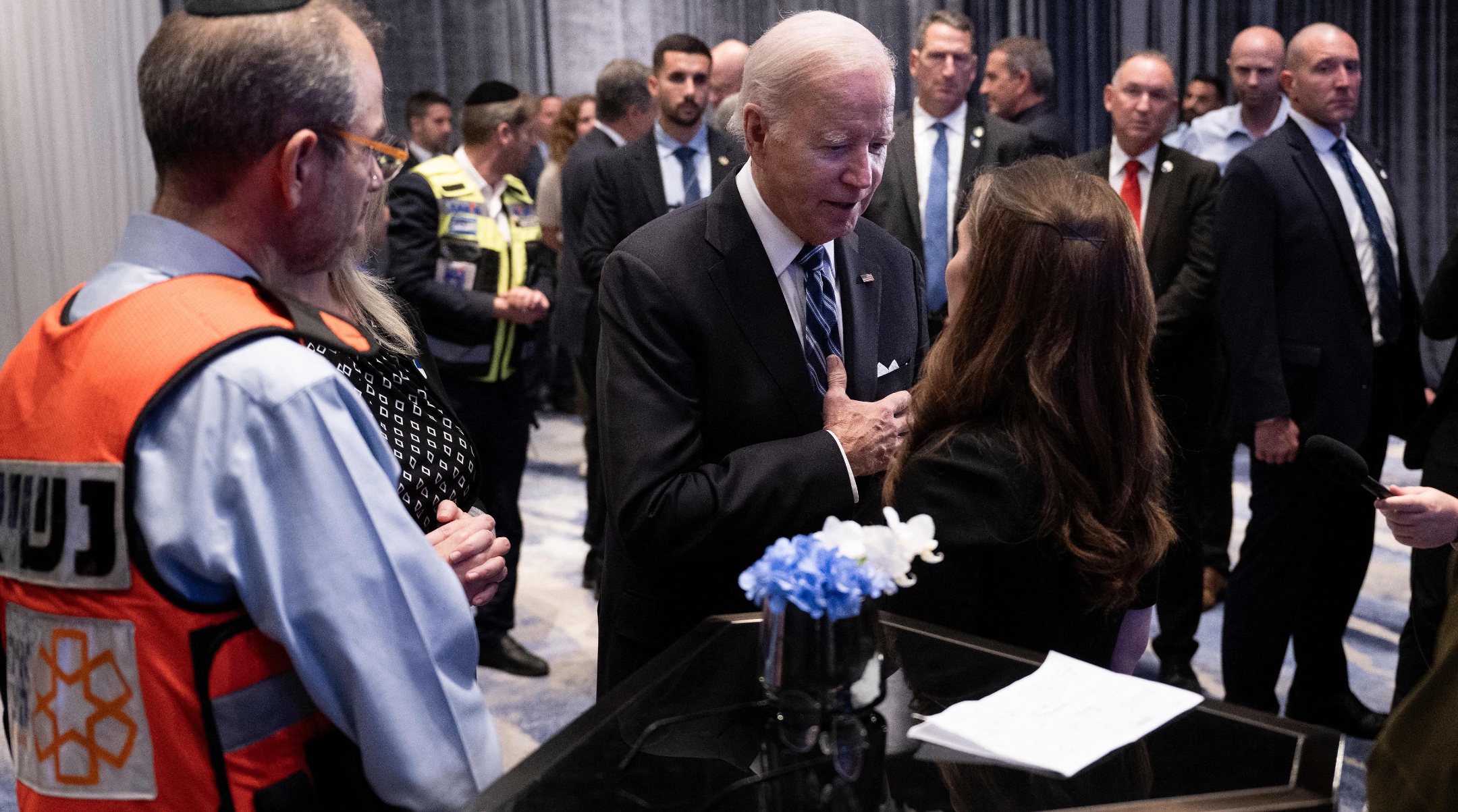For US officials, Israeli hostage deal brings joy — and hard questions about how much more war to support
As Israel pauses its war with Hamas to allow for the release of hostages, it will face questions about how, and whether, it restarts its war to defeat the terror group behind the abductions

U.S. President Joe Biden meets with people affected by this month’s attacks by the terrorist group Hamas on Israel, in Tel Aviv, Oct. 18, 2023. (Brendan Smialowski/AFP via Getty Images)
WASHINGTON (JTA) — If the provisions of a likely agreement bear out and Hamas releases dozens of hostages, U.S. officials will celebrate alongside the Israelis.
But then will come the questions about how, and whether, Israel restarts its war to defeat the terror group behind the abductions.
Analysts and scholars with ties to Israel’s government say the country’s security officials are already anticipating those questions, as it appears that Hamas is set to release as many as 50 hostages — mostly women and children — this week. In exchange, Israel will release about three times as many imprisoned Palestinians and will pause its invasion of Gaza for four days.
Jonathan Schanzer, a vice president of the conservative-leaning Foundation for Defense of Democracies, who has been speaking to Israeli government officials, said he expects the initial pause to lead to demands for a longer break in the fighting.
“Once there’s calm there are going to be international efforts to extend the calm because as far as the international community goes, quiet is a good thing,” he said.
Israel has vowed to restart its campaign after the pause, but calls for a long-term ceasefire are already increasing internationally and among Democrats in Congress. Recently, a rising number of Congress members and senators — including some Jewish lawmakers — have voiced calls for a ceasefire or criticized Israel’s conduct in Gaza. About 40 Democrats in total have called for a ceasefire, although a number of their statements are qualified with demands that Hamas be dismantled and all the hostages be released — which are also Israel’s stated goals.
Watching how those Democrats respond during the anticipated pause in fighting will be key to understanding whether support for Israel will further erode, said Kevin Rachlin, the vice president of public affairs for J Street, the liberal Jewish Israel lobby that is influential among Democrats.
He pointed to a letter signed this week by 13 Senate Democrats, including leaders in the caucus, calling on Biden to press Israel to come up with a detailed plan for “sustained humanitarian aid” for the Gaza Palestinians.
“The growing pressure that we’re seeing right now is not just [because of] the civilian death toll but also on the finite definition of what does success look like with this military operation?” Rachlin said. “I think with a pause, that allows more of these questions to come into the forefront. You’ll start to see more members talk and ask about that more forcefully.”
U.S. Secretary of State Antony Blinken will visit Israel during the pause, the Israeli news site Walla reported late Tuesday. It will be his fourth trip to the country since Oct. 7.
The Biden administration continues to back Israel’s war aims — although it too has questions about how Israel will conduct the war once the pause is over. In a call with reporters on Thursday, National Security Council spokesman John Kirby said the administration had questions about how Israel would expand its military campaign in the southern part of the Gaza Strip, considering that Israel previously encouraged hundreds of thousands of civilians to move southward while it waged war with Hamas in the north.
“As they consider moving their operations to the south, we have said we don’t support those kinds of operations absent a cohesive plan by the Israelis to factor in how they’re going to be able to protect what is now mathematically a dramatically increased civilian population, because they were evacuated from the north at Israel’s urging,” he said.
Extending the pause into a ceasefire is not an option for Israel, which has vowed to eradicate Hamas, Prime Minister Benjamin Netanyahu said on Tuesday evening as his cabinet met to vote on the terms of the hostage release.
“I am here to say the war will continue” after the release, Netanyahu said in a press conference before the vote, which appeared guaranteed to approve the deal. “We will not give up until we achieve absolute victory and we return them all.”
Schanzer said the demands of the Israeli public left no other choice for Netanyahu.
“The Israeli government is or was deemed to be in violation of its contract with the people of the south” on Oct. 7, when Hamas terrorists breached Gaza’s border with southern Israel and killed 1,200 people, most of them civilians, and abducted some 240 people, Schanzer said.
To restore trust with its population, Schanzer said, “from the government’s perspective, the goal is to completely clean out Hamas from the Gaza Strip so that the southern communities can return and live normal peaceful lives. Every Israeli that I’ve talked to since the start of this war has said that there cannot be a return to 10/6.”
In response to a Jewish Telegraphic Agency question, a spokesman for the Biden administration’s National Security Council said its support for Israel’s war against Hamas would not wane, citing a statement from a Hamas spokesman vowing to repeat the Oct. 7 attack.
“What we do not support are calls for Israel to stop defending itself from Hamas terrorists, which is what a permanent ceasefire would be,” the spokesman said, “Hamas has warned that what happened on October 7th ‘will happen again and again and again’ until Israel is annihilated. These comments are horrifying and are an important reminder of how much is at stake.”
Still, it was clear from the spokesman’s reply that the Biden administration still had questions about how Israel will conduct its war once it resumes. Biden officials are not happy with the frequency and extent of the humanitarian pauses Israel has recently agreed to.
“For a humanitarian pause to be fully successful, we have to have in place a system to maximize aid delivery and ensure the protection of humanitarian workers while also working to secure the release of hostages, and prevent the terrorists from using the pause to take advantage,” said the spokesman. “This is complex and we are continuing to work in earnest towards this goal.”
Kirby mentioned one measure of “fully successful” in his call with the media: the amount of humanitarian aid Israel allows into Gaza. “Our incremental goal was about [trucks of aid] 150 a day and we’re not close to achieving that,” Kirby said.
Since Israel struck back, the Hamas-run Gaza Health Ministry says that more than 12,000 people have been killed, including thousands of children. It is not clear what portion of that total number are combatants, or how many have been killed by misfired missiles aimed at Israel.
David Makovsky, a fellow at the Washington Institute for Near East Policy, which has close ties to the U.S. and Israeli governments, said the pause would give Israel an opportunity to present to the Biden administration a detailed plan for its next steps.
“It’s a way for Israel to explain to the U.S. what it looks like,” he said of the continuation of the war. “Now you have 2 million people all in the south, and you’re going to have to navigate that,” he said. “That’s where, I think, the U.S. needs to be convinced.”
As of now, Biden stands as a bulwark against pressure for a ceasefire, Makovsky said, but that could change if the war becomes a quagmire with no clear way out.
“He’s going to be supportive but if he feels that Israel is stalled and that it’s not making progress on the objective, then I think there will probably be a reassessment,” he said.
This article originally appeared on JTA.org.
A message from our CEO & publisher Rachel Fishman Feddersen

I hope you appreciated this article. Before you go, I’d like to ask you to please support the Forward’s award-winning, nonprofit journalism during this critical time.
At a time when other newsrooms are closing or cutting back, the Forward has removed its paywall and invested additional resources to report on the ground from Israel and around the U.S. on the impact of the war, rising antisemitism and polarized discourse..
Readers like you make it all possible. Support our work by becoming a Forward Member and connect with our journalism and your community.
— Rachel Fishman Feddersen, Publisher and CEO




















